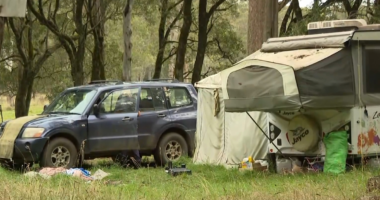Share this @internewscast.com
Left: U.S. District Judge John McConnell (U.S. District Court for the District of Rhode Island). Right: FILE – President Donald Trump walks from Marine One after arriving on the South Lawn of the White House, Tuesday, July 15, 2025, in Washington. (AP Photo/Alex Brandon, File).
In a dramatic development, a federal judge in Rhode Island has taken the Trump administration to task for not preventing the lapse of Supplemental Nutrition Assistance Program (SNAP) benefits during the recent government shutdown. This disruption, which marks a historic first for the nation, potentially affects up to 42 million Americans. In response, the Department of Justice (DOJ) has filed urgent appellate documents, shifting the blame onto Congress and accusing the judge of undermining the separation of powers.
The DOJ’s submission to the 1st Circuit U.S. Court of Appeals marks the beginning of what promises to be an eventful Friday. The appellate court has swiftly instructed the plaintiff group, consisting of churches, cities, nonprofits, a labor union, and a grocery store, to provide their response by midday.
In seeking an emergency stay of U.S. District Judge John McConnell’s order, which mandates the full disbursement of SNAP benefits by Friday, the Trump administration deflected responsibility onto Congress. They argued that the crisis was due to Congress failing to allocate the necessary funds for the fiscal year.
“Congress has not appropriated funds to cover Supplemental Nutritional Assistance Program (‘SNAP’) benefits for this fiscal year,” the DOJ stated. “Even after utilizing the entire SNAP contingency reserve—a measure the Department of Agriculture (‘USDA’) implemented earlier this week in response to a temporary restraining order from the district court—funds are only sufficient to cover partial SNAP benefits for November.”
The administration characterized the situation as a crisis born of congressional inaction, insisting it requires a legislative solution. They sharply criticized Judge McConnell, appointed by Barack Obama, for asserting he had the authority to resolve the “SNAP shortfall” by reallocating billions from school lunch funds in a single day.
Describing the judge’s order as an “unprecedented injunction,” the DOJ claimed it “makes a mockery of the separation of powers,” arguing that McConnell lacked the legal grounds to compel the USDA to scrounge for funds as if searching for spare change.
Worse yet, the DOJ said, the judge claimed it was “arbitrary and capricious” of the government to “decline to raid school-lunch money to instead fund SNAP benefits,” framing that not as robbing Peter to pay Paul but “starv[ing] Peter to feed Paul, as it were.”
The DOJ also claimed that President Donald Trump’s social media post three days ago, in which he said SNAP benefits “will be given only when the Radical Left Democrats open up government, which they can easily do, and not before!” — despite McConnell’s contingency funding order — was “just stating a fact.”
“The district court also accused the President of bad faith for declaring that full SNAP benefits would not resume until the government reopens. But that was just stating a fact—the appropriation has lapsed, and it is up to Congress to solve this crisis,” the DOJ continued. “Unfortunately, the district court’s short-sighted injunction has thrust the Judiciary into the ongoing shutdown negotiations and may well have the effect of extending the lapse in appropriations, exacerbating the problem that the court was misguidedly trying to mitigate.”
The judge had given the government two options.
The first was to pay out this month’s allotments in full. The second option was to issue “partial payments” while working to “expeditiously resolve the administrative and clerical burdens” the USDA previously cited as a barrier to releasing reduced benefits.
The groups suing the Trump administration one week ago assigned blame to the executive for “needlessly” plunging SNAP into a “crisis,” arguing that there were billions of dollars in contingency funds for food stamps available.
Even more recently, the plaintiffs said the government “failed” to stop the crisis even on a partial basis.
In response after noon, the plaintiffs insisted on McConnell’s order remaining in place.
The Trump administration, the response said, “failed to comply” and should not be rewarded with delay after its “arbitrary and pretextual refusal to provide full funding to provide relief for children and families who are going hungry today.”
“[T]he district court did not abuse its discretion in concluding that their decision to make partial
payments despite the attending weeks or months of delays was arbitrary and that—given the emergency circumstances of the government’s own creation—this left only one choice available to mitigate the irreparable harm to Plaintiffs and millions of other Americans: utilize the undisputedly available funds to make full November payments,” the filing said, adding that is “facially implausible” to say that there is a “realistic threat” of underfunding Child Nutrition programs by diverting billions of dollars to SNAP.
“Defendants’ claimed desire to conserve those funds for Child Nutrition programs—programs that have $23 billion on hand and require only $3 billion per month to operate—is facially implausible,” the response went on.















